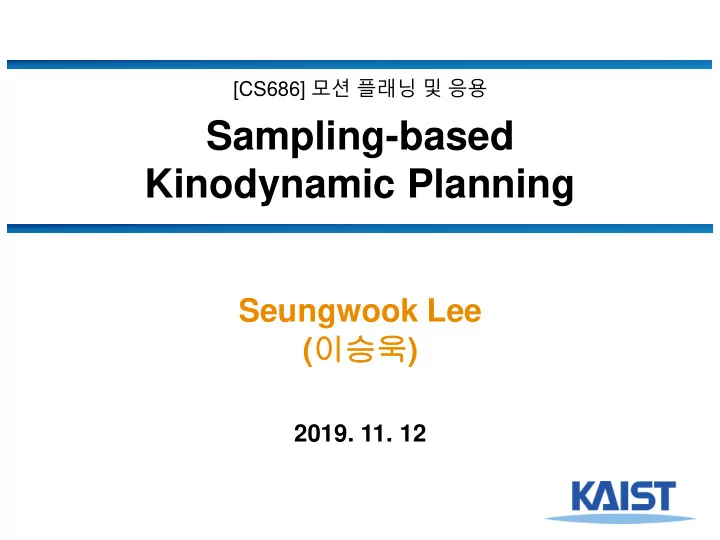

[CS686] 모션 플래닝 및 응용 Sampling-based Kinodynamic Planning Seungwook Lee ( 이승욱 ) 2019. 11. 12
Index ● Motivations ● Approaches ● Paper 1 ● Paper 2 2
Motivation ● Real-world implementation ● How to follow the jerky path… 3
Motivation ● Constraints exist in real-world ● May face dynamic environments ● Inertia ● Limited controllability ● Limited sensors ● Limited actuators ● Example: for cars, steering angle and its derivative are finite. 4
Motivation ● Kinematic constraints ● Mechanum wheeled robot vs. Car-like robot ● Cannot perform translation to the sides. ● Dynamic constraints Bicycle model: ● Actuation force is limited 𝜀 = atan 𝑀 ● Limited a=F/m -> limited 𝑆 v -> limited x 𝜀 : steering angle L: car length R: turn radius 5
Motivation ● Problem Statement 𝑦 𝑢 ≤ 𝑑 𝑞, … , 𝜄, ሶ where, 𝒚(𝒖) = 𝑞, ሶ 𝜄, … 6 *Randomized Kinodynamic Planning for Constrained Systems, ICRA 2018 Youtube
Previous Researches ● LaValle and Kuffner (2001): Randomized Kinodynamic Planning ● Webb and van den Berg (2013): Kinodynamic RRT*: Asymptotically Optimal Motion Planning for Robots with Linear Dynamics ● Allen and Pavone (2016): The Real-Time Framework for Kinodynamic Planning Applied to Quadrotor Obstacle Avoidance 7
Approaches • KCRSS: Kinematic Constraints based Random State Search • Closed-loop predictions 8
KCRSS(Kinematic Constraints based Random State Search) • No constraints • Define q_new directly • With constraints • Define q_new as far as u permits [CS686] Professor Yoon’s lecture 6 9
KCRSS(Kinematic Constraints based Random State Search) ● Impose kinematic constraints in the node generation process. ● Add only the kinematically feasible nodes -> reduction of nodes. 10
KCRSS(Kinematic Constraints based Random State Search) ● Identify deviation of orientation 𝛽 ● Propagate states based on kinematic constraints ● Collision check 11
Closed-loop Predictions ● Simulate -> obtain output x ● 𝑣 𝑢 = 𝑠 𝑢 ● 𝑦 𝑢 + 1 = 𝑔(𝑦 𝑢 , 𝑣 𝑢 ) ● Dynamically feasible by construction. 12
Closed-loop Predictions ● Sample an output point y_rand ● Improve solution ● Extract a reference with lowest-cost trajectory. 13
Paper 1 Author : Ghosh Title : Kinematic Constraints Based Bi-directional RRT (KB-RRT) with Parameterized Trajectories for Robot Path Planning in Cluttered Environment Conference : ICRA 2019 ● KCRSS ● BI-RRT ● Improved time(iterations) and memory usage 14
BI-RRT(Bidirectional RRT) ● Effective in narrow environments ● Efficient computing ● Grow two trees 15
Trajectory Generation ● Resulting trajectory may not be optimal – need preprocessing ● Parametrized Trajectory Generator (PTG−α) 16
Experiment Scenarios ● Scenario 1: Maze (one open) ● Scenario 2: Tunnel ● Scenario 3: Maze (no open) 17
Scenario 1 18
Scenario 2 19
Scenario 3 20
21
Paper 2 Author : Arslan Title : Sampling-based Algorithms for Optimal Motion Planning Using Closed-loop Prediction Conference : ICRA 2017 ● Closed-loop prediction ● RRT# 22
RRT* vs. RRT# ● Classify vertices: 4 types of cost-to-come ● Can utilize promising neighbor vertex ● No expansion of non-promising vertices -> better speed 23
RRT* vs. RRT# 24
RRT* vs. RRT# 25
Summary ● Define kinematics and dynamics of the robot ● Simulate forward ● Keep only the feasible nodes 26
Thank you 27
Quiz ● Q1. When implemented to a real-world robotic system, planning and control are irrelevant to each other. (T/F) ● Q2. Kinodynamic feasibility is achieved by propagating the states forward in time. (T/F) 28
Recommend
More recommend